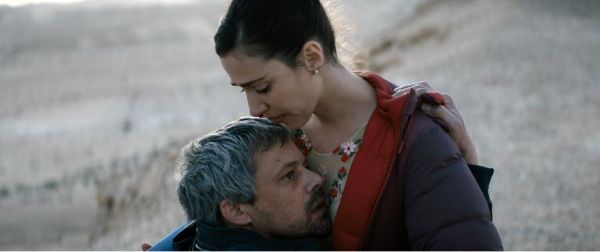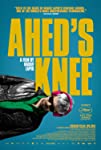Eye For Film >> Movies >> Ahed's Knee (2021) Film Review
Ahed's Knee
Reviewed by: Nikola Jovic

After their international success, two years ago, with the politically charged, Berlin Film Festival Golden Bear winning comedy Synonyms, father and son Haim and Nadav Lapid have written yet another provocative political film (with Haim credited as a consultant on the screenplay, and Nadav returning as the director and the main writer), which premiered this July at Cannes. Its international debut, just two months after the latest conflicts in the Gaza Strip, made the subject matter all the more contemporary, urgent and pressing. And it is exactly because of that importance and the fact that the film draws obvious parallels with Nadav’s personal experience as well, that it leaves an impression of perhaps trying too hard.
A hasty motorcycle ride plunges us into the story, the scene is moody, raindrops drizzle. An eccentric and permanently exasperated film director, simply known as Y (Avshalom Pollak) - who just won a major prize at the Berlin Film Festival - is in the pre-production process for his next film about 16-year-old Palestinian activist Ahed Tamimi, who drew lots of attention when a video of her slapping an Israeli soldier went viral. One particular comment by a Twitter user, expressing an urge to shoot her in the knee, enamoured Y with the idea of making it a centerpiece motif of his new film. An overall ostentatious and craggy, but nonetheless exciting sequence of events quickly gets abbreviated by a sudden transition to an airplane ride, never to be mentioned and brought up again.
Y has been invited to attend a showing of his film at a local library in the region of Arava, located in a faraway desert valley, south of the Dead Sea basin. When he gets there, Y meets charmingly good-natured and jaunty librarian, Yahalom (Nur Fibak), who is a big fan of his. After some, getting-to-know chit-chat Yahalom informs him that in order for the showing to be approved and for him to get paid, Y will have to sign a list of government-approved subjects for the audience discussion. Yahalom doesn’t like it either, but she tries to do her best for the community within the given framework. Y however finds it highly offensive, morally and politically disgusting, making him dead-set on leaking those oppressive practices to the international press. The only thing is, the executors of that censorship are well-intentioned people like Yahalom, who only mean well for their personal communities. Is Y himself in all of his rage and stubbornness, turning into the very thing he’s been fighting against in his art?
Nadav has managed to fit a lot in here. Although the film starts by critically addressing the Israel conflict and their custom of silently ignoring humanitarian crises happening at their doorstep, through the viewpoint of its main character, the story slowly starts to shift in the second half. Love and appreciation of the director’s late mother, the Israeli/Palestinian conflict, the theme of where is the line between the oppressor and the oppressed drawn… All of those potent subjects and opposing stylistic choices, make for an unbalanced underpinning of the story, running the risk of being overbearing, confusing its audience by back-walking decisions the film makes prior to every new shift in storytelling. For a movie so packed, one would imagine a story that doesn’t give you any break, but with Ahed’s Knee’s sudden breaks into songs, long walks cut to catchy music, breakings of 180 rule, unmotivated shakes, pans, and tilts. It allows itself the luxury of having too much filler while neglecting crucial motifs and plot points on the one hand, to then introduce characters late in the running time, only to use them as plot devices near resolution.
As a whole, it appears way too kinetically ostentatious for its own sake, sadly making it less than the sum of its parts, but there are things to appreciate here. It should be noted that the two main performers easily carry the film. Pollak plays the often confusing and eccentric character of Y with cunning and charisma, challenging your limits of what you are willing to put up with, and Fibak radiates charm and grace whenever the two of them share the screen, making us frustrated at Y all the more. The fact that this is Fibak’s debut appearance in a feature, only adds to this. The opening series of sequences are an attention-grabbing display of kinetic energy, its conclusion about activism in art and combating fire with fire - ultimately channeling Nietzschean themes of “the abyss staring back” - are often neglected in a world where it seems that every week there is a new emergency call-to-action, as a response to an emergency, making them an important contribution to the discourse. But in between its beginning and the implied moral of the story, there is an unfocused tale with a contrived resolution that weighs the whole construction down.
Reviewed on: 22 Dec 2021
















